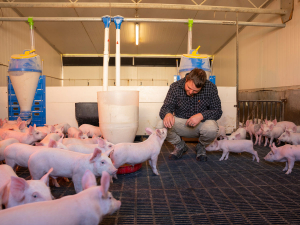NZPork Urges Government to Protect Productive Rural Land in Planning Reform
NZPork says the Government needs to strengthen its proposed planning laws to ensure New Zealand's pig farmers can continue to produce pork.
 Around two thirds of pork consumed in New Zealand comes from countries that fail to meet our animal welfare standards.
Around two thirds of pork consumed in New Zealand comes from countries that fail to meet our animal welfare standards.
Almost two thirds of pork consumed in New Zealand comes from countries that fail – and are not required – to meet our animal welfare standards.
That’s according to NZ Pork chief executive Brent Kleiss, who calls the differences between imported and NZ pork “clear”.
“Based on the countries supplying about 98% of imported pork last year, all of the European countries except Sweden, plus Canada, routinely confine sows in gestation stalls for the first four weeks of pregnancy, while the USA can confine sows for the entire pregnancy.”
Gestation stalls were banned in New Zealand in 2015.
More than 50,000 metric tonnes (t) of overseas pork was imported into New Zealand in 2022, with the highest volume coming from Spain at 11,450t, a big increase on the 6,328t imported during 2021.
Runners up include Germany with 11,158t, Poland with 5,267t, Canada at 4,541t, Finland with 4,407t and the USA at 3,867t.
Kleiss said that New Zealand’s pork sector has more stringent welfare and environmental standards and enforcement regimes than most other countries, with only Sweden – accounting for 2,976t in 2022 – having higher standards of pig welfare than New Zealand in some areas such as higher minimum spaces and more access to bedding materials.
Australia, which exported 2,807t of pork to New Zealand in 2022, comes close to Kiwi standards, with most Australian pig farmers not using gestation stalls. However, this is by voluntary agreement rather than the legislated requirement it is in New Zealand.
Piglets are routinely castrated in Europe, the USA and Canada, with Spain, Poland and the USA not using pain relief.
In Australia, castration without pain relief is still permitted if piglets are less than three weeks old. New Zealand farmers do not castrate piglets at all.
EU countries and the USA also have no limit on the amount of time a sow may be confined in a farrowing crate, either before or after giving birth. Canada allows up to six weeks.
New Zealand has minimum standards and regulations placing limits on the length of confinement in a crate and describes the spatial requirements of a farrowing crate.
Sows are only housed in farrowing systems when it is time for them to give birth and care for their piglets, spending a maximum of 28 days in conventional indoor systems after giving birth and up to five days pre-farrowing.
A spokesperson for the Ministry of Trade, Sharon Lundy, told Rural News that while under current FTA’s a ban on imported pork that fails to meet New Zealand standards could not be implemented, the EU and UK FTA’s were endeavouring to not weaken or reduce protections afforded to farmed animals welfare and promoting positive animal welfare practices.
However, there was a caveat that this was done without “materially affecting trade or investment between parties” – a very vague statement open to interpretation.
Kleiss said the EU was reviewing animal welfare standards to eventually bring them into line with New Zealand, but this would likely not be the case for Canada or the USA anytime soon.
“We urge Kiwis to back New Zealand pig farmers and always look for a 100% NZ Pork label so they know they’re getting a cut above the rest. We believe it’s time that all imported pork is required to meet our high standards.”
Recent weather events in the Bay of Plenty, Gisborne/Tairawhiti, and Canterbury have been declared a medium-scale adverse event.
DairyNZ's chief executive Campbell Parker says the 2024/25 dairy season reinforces the importance of the dairy sector to New Zealand.
A New Zealand agribusiness helping to turn a long-standing animal welfare and waste issue into a high-value protein stream has won the Australian dairy sector's top innovator award.
OPINION: A bumper season all around.
Dairy Women's Network (DWN) has announced that Taranaki dairy farmer Nicola Bryant will join its Trust Board as an Associate Trustee.
Rural Women New Zealand (RWNZ) says it welcomes the release of a new report into pay equity.

OPINION: A mate of yours truly reckons rural Manawatu families are the latest to suffer under what he calls the…
OPINION: If old Winston Peters thinks building trade relations with new nations, such as India, isn't a necessary investment in…